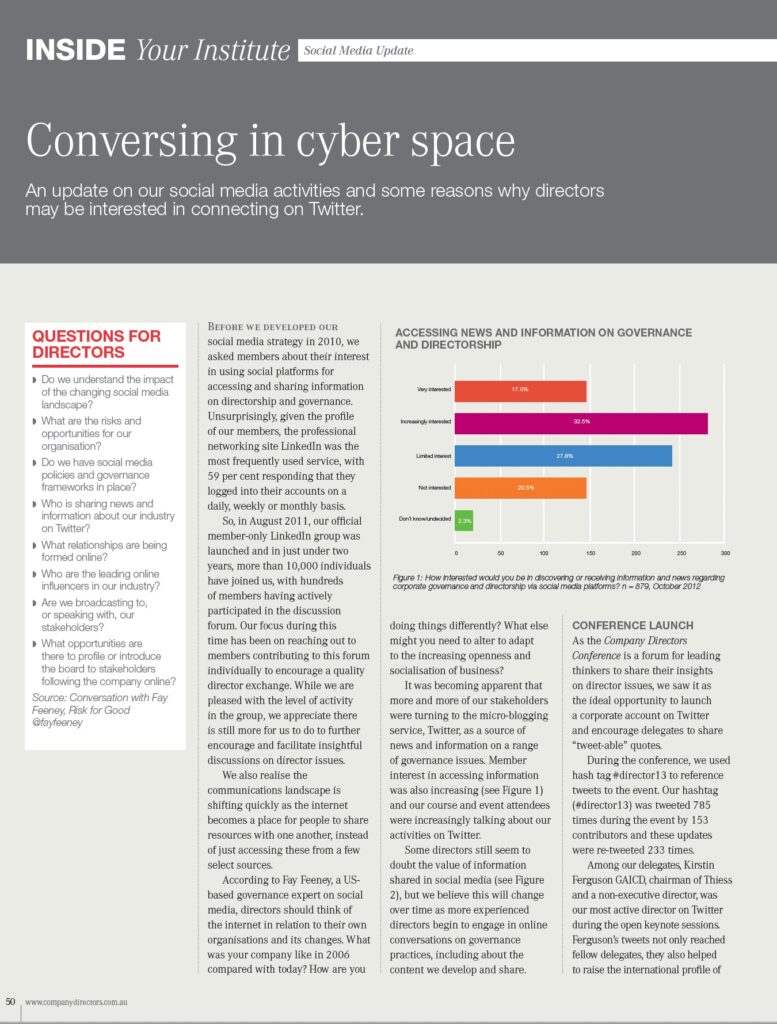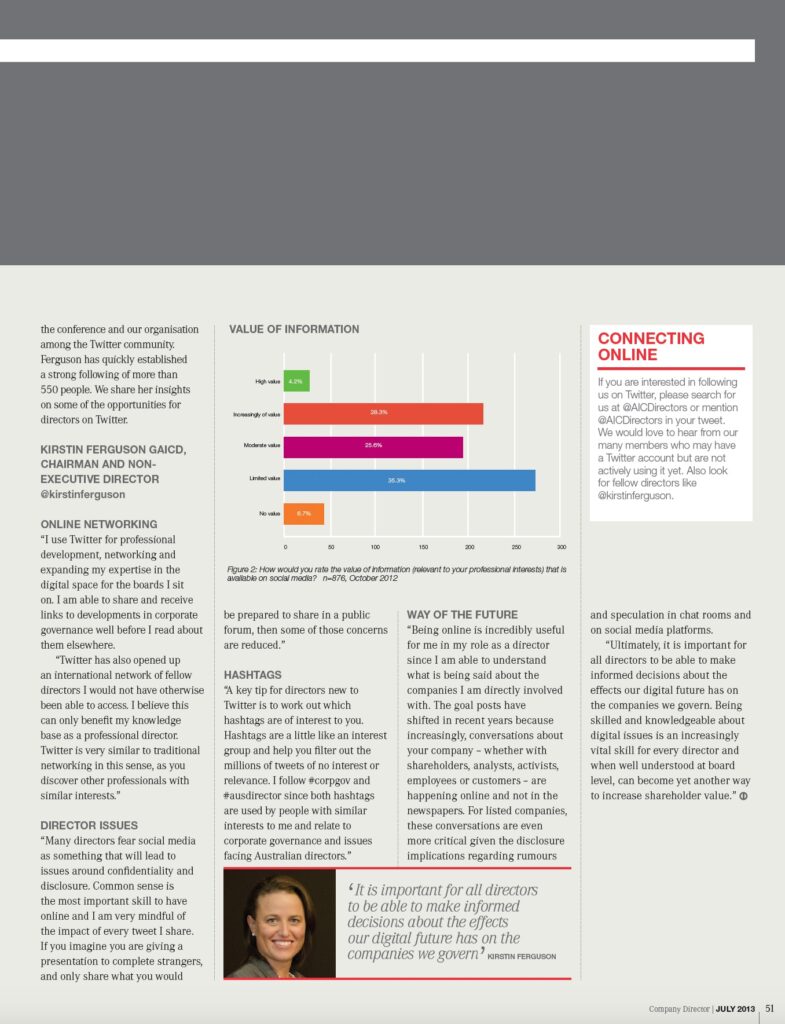
Complete the Head & Heart Leader Scale™ and receive a free, personalised report here.
Complete the Head & Heart Leader Scale™ and receive a free, personalised report here.
July 2013
An update on our social media activities and some reasons why directors may be interested in connecting on Twitter.
Before we developed our social media strategy in 2010, we asked members about their interest in using social platforms for accessing and sharing information on directorship and governance. Unsurprisingly, given the profile of our members, the professional networking site LinkedIn was the most frequently used service, with 59 per cent responding that they logged into their accounts on a daily, weekly or monthly basis. So, in August 2011, our official member-only LinkedIn group was launched and in just under two years, more than 10,000 individuals have joined us, with hundreds of members having actively participated in the discussion forum. Our focus during this time has been on reaching out to members contributing to this forum individually to encourage a quality director exchange. While we are pleased with the level of activity in the group, we appreciate there is still more for us to do to further encourage and facilitate insightful discussions on director issues. We also realise the communications landscape is shifting quickly as the internet becomes a place for people to share resources with one another, instead of just accessing these from a few select sources. According to Fay Feeney, a USbased governance expert on social media, directors should think of the internet in relation to their own organisations and its changes. What was your company like in 2006 compared with today? How are you
doing things differently? What else might you need to alter to adapt to the increasing openness and socialisation of business? It was becoming apparent that more and more of our stakeholders were turning to the micro-blogging service, Twitter, as a source of news and information on a range of governance issues. Member interest in accessing information was also increasing (see Figure 1) and our course and event attendees were increasingly talking about our activities on Twitter. Some directors still seem to doubt the value of information shared in social media (see Figure 2), but we believe this will change over time as more experienced directors begin to engage in online conversations on governance practices, including about the content we develop and share.
Conference launch
As the Company Directors Conference is a forum for leading thinkers to share their insights on director issues, we saw it as the ideal opportunity to launch a corporate account on Twitter and encourage delegates to share “tweet-able” quotes. During the conference, we used hash tag #director13 to reference tweets to the event. Our hashtag (#director13) was tweeted 785 times during the event by 153 contributors and these updates were re-tweeted 233 times. Among our delegates, Kirstin Ferguson GAICD, chairman of Thiess and a non-executive director, was our most active director on Twitter during the open keynote sessions. Ferguson’s tweets not only reached fellow delegates, they also helped to raise the international profile of the conference and our organisation among the Twitter community. Ferguson has quickly established a strong following of more than 550 people. We share her insights on some of the opportunities for directors on Twitter.
Online Networking
“I use Twitter for professional development, networking and expanding my expertise in the digital space for the boards I sit on. I am able to share and receive links to developments in corporate governance well before I read about them elsewhere. “Twitter has also opened up an international network of fellow directors I would not have otherwise been able to access. I believe this can only benefit my knowledge base as a professional director. Twitter is very similar to traditional networking in this sense, as you discover other professionals with similar interests.”
Director Issues
“Many directors fear social media as something that will lead to issues around confidentiality and disclosure. Common sense is the most important skill to have online and I am very mindful of the impact of every tweet I share. If you imagine you are giving a presentation to complete strangers, and only share what you would be prepared to share in a public forum, then some of those concerns are reduced.” =
Hashtags
“A key tip for directors new to Twitter is to work out which hashtags are of interest to you. Hashtags are a little like an interest group and help you filter out the millions of tweets of no interest or relevance. I follow #corpgov and #ausdirector since both hashtags are used by people with similar interests to me and relate to corporate governance and issues facing Australian directors.”
Way of the future
“Being online is incredibly useful for me in my role as a director since I am able to understand what is being said about the companies I am directly involved with. The goal posts have shifted in recent years because increasingly, conversations about your company – whether with shareholders, analysts, activists, employees or customers – are happening online and not in the newspapers. For listed companies, these conversations are even more critical given the disclosure implications regarding rumours and speculation in chat rooms and on social media platforms.
“Ultimately, it is important for all directors to be able to make informed decisions about the effects our digital future has on the companies we govern. Being skilled and knowledgeable about digital issues is an increasingly vital skill for every director and when well understood at board level, can become yet another way to increase shareholder value.”






